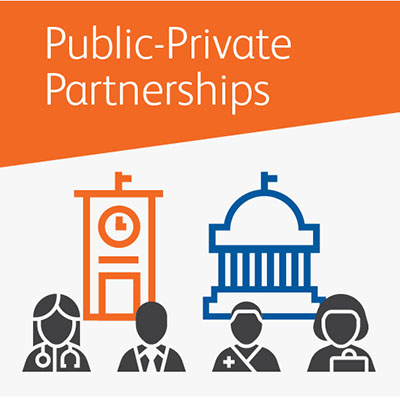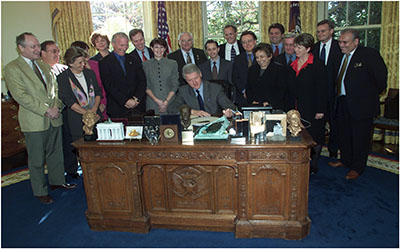BD has long been known for its public-private partnerships to tackle global challenges
On March 13, BD attended a White House meeting with President Trump, Vice President Pence, HHS Secretary Azar and others, alongside CEOs of companies who have been involved in the effort to expand access to COVID-19 testing and test development.
The meeting, which encouraged the private sector to continue innovating with full support from the U.S. government, was an example of BD’s long history of building relationships with the public sector to address and tackle global challenges, particularly in times of crisis.
- In 1952, BD developed the first sterile disposable blood collection set, at the request of the American Red Cross, in order to support treatment of American soldiers on the battlefield during the Korean War. The technology to sterilize single use medical devices was developed by BD, enabled in part by the company’s acquisition of Baltimore Biological Laboratories which also launched the company into the field of diagnostic medicine.
- In 1954, Jonas Salk initiated the largest human clinical trial in history, when one million children were immunized to test the newly developed Salk polio vaccine. BD collaborated with the Institute for Infantile Paralysis (now the March of Dimes), to develop the first single use, sterile disposable syringes (a forerunner of today’s BD Hypak™ syringe) that enabled this landmark clinical trial to move forward.
- Starting in the late 1980s and throughout the 1990s, at a time when the HIV & AIDS pandemic was the most threatening infectious disease worldwide, BD collaborated with professional societies including the National League for Nursing and American Medical Association, and with safety advocates such as Dr. Janine Jagger from the University of Virginia and Dr. Marquerite Jackson from the University of California, to advance protection of health workers from sharp object injuries that could spread HIV and other infectious diseases from patient to clinician. The company engaged in the development of educational programs and surveillance tools and invested massively in the redesign of its broad portfolio of needle-based medical devices, in order to build into integral features to protect health workers from accidental injuries. BD also engaged extensively in related policy activities, and in 2000, BD participated in the White House Oval Office signing ceremony of the first national law to protect health workers from ‘sharps’ injuries. BD also engaged in policy initiatives in Europe that led to a European Union-wide directive to protect health workers, enacted in 2010.
- In 2017, BD and the United States Agency for International Development (USAID) formed the STRIDES (Strengthen TB Resistance Testing and Diagnostic Systems) program to address drug-resistant tuberculosis (TB) patients in select high-burden TB countries, and to better understand the barriers that stand in the way of patient access to life-saving TB testing. This respiratory illness remains the world's leading infectious disease killer.
- Recently, the company celebrated 13 years of partnership with the U.S. Department of State - President’s Emergency Plain for AIDS Relief (PEPFAR), the U.S. Centers for Disease Control (CDC) and country ministries of health to strengthen laboratory systems in sub-Saharan Africa and India through the Labs for Life partnership. This public-private partnership has had enormous positive impact, with results published in The Journal of Infectious Diseases. Also through this partnership, BD launched infection prevention and control programs in Kenya and India together with the respective ministries of health in 2019.
The coronavirus pandemic demonstrates just how vulnerable the world’s population is to infectious disease risks and outbreaks. We’ve seen natural parallels between the objectives for combatting COVID-19 and antimicrobial resistance (AMR) – when medications commonly used to treat infections stop working because the organism becomes resistant to the drug. Both of these global health challenges rely heavily on effective infection prevention and control, accessible testing, and surveillance and reporting data to track prevalence, progression and patient outcomes.
Based on the fundamental premise that health challenges and threats as large and encompassing as AMR and COVID-19 cannot ever be addressed by one sector alone, BD engages in extensive cross-sector collaboration with leading health agencies, foundations and other organizations around the world, underpinned by common motives and goals.
The company has also been recognized by both the private and public sector for its expansive global efforts and investments to combat the threat of AMR, including the improvement of AMR-related awareness, education and training; surveillance and research; infection prevention measures; and the advancement of diagnostic testing.
As COVID-19 cases continue to increase around the world, BD is working hard to provide health care workers and patients with access to critical tests and medical supplies, including ramping up production of sample collection and transport tools, increasing access to the company’s automated molecular platform for in vitro diagnostics, and developing an assay for a point of care device, as well as committing $1.1 million to global response efforts.
Subscribe to receive BD blog alerts

